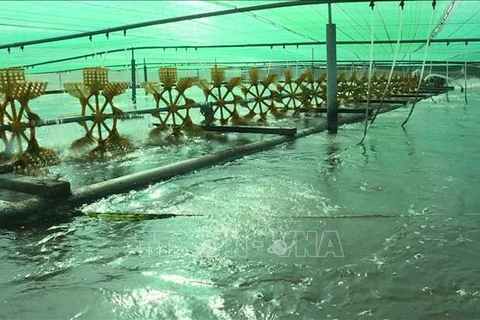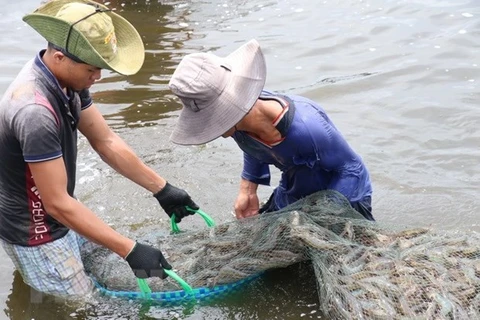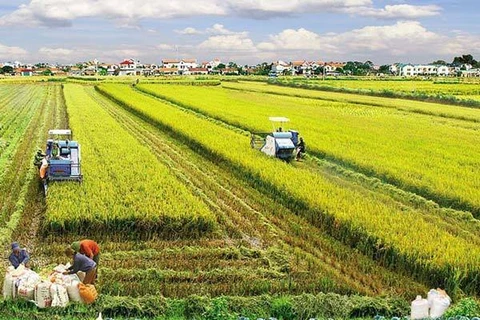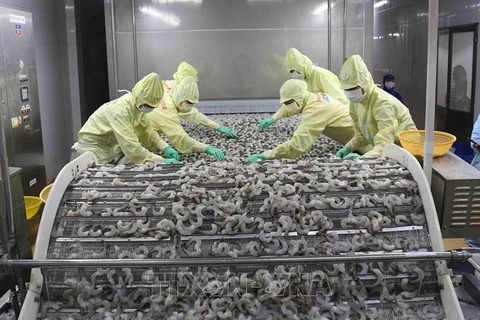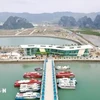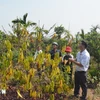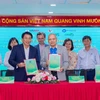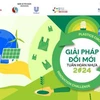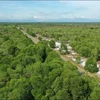Can Tho (VNA) – New farming solutions have helped reduce greenhouse gas (GHG) emissions by nearly 17% in extensive shrimp farms and nearly 11% in intensive farms, according to a research on monitoring GHG emissions from shrimp farming ponds.
The research is part of the "Energy transition and climate change mitigation in Mekong Delta" project co-funded by ActionAid Vietnam and Bread for the World (BfdW) from 2021 to 2023.
Associate Prof. Dr. Le Anh Tuan, a senior lecturer from Can Tho University who represents the research team, said that GHG emissions recorded in shrimp farms in Dong Hai district of Bac Lieu province showed that emissions released from intensive shrimp farming model are 15 times higher than that from extensive shrimp farming model.
Findings from the research revealed that while farming density, pond dredging and shrimp breeding are the main factors that determine the amount of GHG emitted from extensive shrimp farming ponds, in the intensive shrimp farming model, electricity and shrimp feed are the two major sources of emissions, in which electricity consumption makes up 82% and feed 17% of the total GHG emission, Dr. Tuan said at a conference on November 3.
He said that basing on this result, the research team came up with a number of GHG reduction solutions, including reducing electricity consumption, replacing electricity from fossil energy with renewable energy, treating shrimp waste with biogas composting, optimising shrimp feed intake, changing feeding methods, changing shrimp stocking density, and improving the water treatment system to avoid shrimp diseases.
After nine months of application of the solutions, the GHG emissions released from extensive shrimp farming model dropped 16.9%, while that from intensive shrimp farming model was cut by 10.8%.
Nguyen Trung Hieu, Vice Director of the Bac Lieu Department of Agriculture and Rural Development, said that Bac Lieu, one of the largest shrimp production hubs of the country, has focused on expanding the intensive shrimp farms to reduce negative impacts on the environment.
He held that the determination of major emission sources and provision of solutions to reduce GHG emissions from shrimp ponds are of great help, which needs to be popularised in the coming time.
Associate Prof. Nguyen Hieu Trung, Vice Principal of Can Tho University, said that the research of GHG emissions from aquaculture ponds and the application of GHG emission reduction measures in aquaculture will helping raise public understanding about the importance of reducing emissions and ensuring the sustainability of the aquaculture industry in the Mekong Delta region, contributing to realising Vietnam's commitments to implement the United Nations' sustainable development goals.
At the conference, representatives of state management agencies, research agencies, businesses and shrimp farmers discussed solutions to replicate the shrimp farming model to reduce GHG emissions in the Mekong Delta region. They emphasised the need to strengthen the issuance of guiding documents and organise training to improve awareness and techniques for shrimp farmers, along with favourable policies in the field./.
The research is part of the "Energy transition and climate change mitigation in Mekong Delta" project co-funded by ActionAid Vietnam and Bread for the World (BfdW) from 2021 to 2023.
Associate Prof. Dr. Le Anh Tuan, a senior lecturer from Can Tho University who represents the research team, said that GHG emissions recorded in shrimp farms in Dong Hai district of Bac Lieu province showed that emissions released from intensive shrimp farming model are 15 times higher than that from extensive shrimp farming model.
Findings from the research revealed that while farming density, pond dredging and shrimp breeding are the main factors that determine the amount of GHG emitted from extensive shrimp farming ponds, in the intensive shrimp farming model, electricity and shrimp feed are the two major sources of emissions, in which electricity consumption makes up 82% and feed 17% of the total GHG emission, Dr. Tuan said at a conference on November 3.
He said that basing on this result, the research team came up with a number of GHG reduction solutions, including reducing electricity consumption, replacing electricity from fossil energy with renewable energy, treating shrimp waste with biogas composting, optimising shrimp feed intake, changing feeding methods, changing shrimp stocking density, and improving the water treatment system to avoid shrimp diseases.
After nine months of application of the solutions, the GHG emissions released from extensive shrimp farming model dropped 16.9%, while that from intensive shrimp farming model was cut by 10.8%.
Nguyen Trung Hieu, Vice Director of the Bac Lieu Department of Agriculture and Rural Development, said that Bac Lieu, one of the largest shrimp production hubs of the country, has focused on expanding the intensive shrimp farms to reduce negative impacts on the environment.
He held that the determination of major emission sources and provision of solutions to reduce GHG emissions from shrimp ponds are of great help, which needs to be popularised in the coming time.
Associate Prof. Nguyen Hieu Trung, Vice Principal of Can Tho University, said that the research of GHG emissions from aquaculture ponds and the application of GHG emission reduction measures in aquaculture will helping raise public understanding about the importance of reducing emissions and ensuring the sustainability of the aquaculture industry in the Mekong Delta region, contributing to realising Vietnam's commitments to implement the United Nations' sustainable development goals.
At the conference, representatives of state management agencies, research agencies, businesses and shrimp farmers discussed solutions to replicate the shrimp farming model to reduce GHG emissions in the Mekong Delta region. They emphasised the need to strengthen the issuance of guiding documents and organise training to improve awareness and techniques for shrimp farmers, along with favourable policies in the field./.
VNA

